#VetoSIMCardReg
Explore tagged Tumblr posts
Text
UP Internet Freedom Network endorses Kabataan Partylist for this 2025 Midterm Elections
Aligned with its founding principles of protecting privacy to democratize the cyberspace, UP INTERNET endorses Kabataan Partylist given their track record and commitment to forwarding the interests of the Filipino youth.
In particular, 1st nominee Renee Co has consistently denounced the SIM Registration Act during her term as UP Student Regent. She was one of many who mobilized student organizations and concerned individuals to push the #JunkSIMReg (formerly #BlockSIMCardReg#VetoSIMCardReg) campaign to its initial victories as it was vetoed under Duterte's term. 3rd nominee Jpeg Garcia is also a human rights worker and survivor of the very Anti-Terrorism Act that brought UPLB students/alumni together to establish UP INTERNET in their indignation of the said law.
In endorsing the Kabataan Partylist, we reiterate our very own Electoral Privacy Agenda:
Protect our right to privacy. - Junk the SIM Registration Act. - Repeal policies (e.g. Anti-Terrorism Act) and halt projects (Safe Philippines smart CCTV network) that enable mass surveillance on the Filipino people. - Hold telecommunication companies and government agencies accountable for the frequent data breaches and unauthorized transactions.
Uphold free expression and democracy on the Internet. - Decriminalize cyberlibel under the Cybercrime Prevention Act, which has been used to repeatedly silence dissent. - Reject any attempt to criminalize anonymity and the use of encryption tools. - Investigate and shut down POGOs that have been exposed as troll farms that deliberately spread disinformation.
UP INTERNET believes that the state and those running for office should end repression, surveillance, and attacks on democracy in the digital realm. We must listen and actively work with community leaders, privacy advocates, human rights workers in our genuine interest to protect privacy and towards internet freedom. We invite aspiring legislators to heed this call, and more importantly invite voters to carry these calls before, during, and beyond the elections.#
Read more on the OSR's position on SIM Registration under Renee Co's term:
https://www.facebook.com/upstudentregent/posts/pfbid0UNGX6d8o4JyvACDn1msnrmCDzWNJwnXcriaPeMVrzEA8qM9gqdwTAEPRc691EmoLl
https://www.facebook.com/upstudentregent/posts/pfbid0Sen5Mza7K8PegJyuje1GgiTEmya6ypQWaGqmU9QmnZ7ejT1RVGTsCaBkeBMSSNQEl
https://www.facebook.com/upstudentregent/posts/pfbid0unVhaSJV7sVjfSNeyN7HJGRH5qjM4EkfE4hWfnuhwm7y3ADUraPY8aMbypYSGcppl
Kabataan Partylist Southern Tagalog also expressed their support for the campaign against SIM Registration: https://www.facebook.com/KabataanST/posts/pfbid02pfszQmYSEWtFJmS7kTfX5Xzuz3MXw7oV4a1mWsKjKP1WKFdGaB2fupuge1Zuhh9Jl
0 notes
Text
reposting from my own Twitter thread
first tweeted on 11:25 AM, 02 March 2022 (Philippine Time)
Man, I don't know how I expect myself to concentrate in class today when the SIM Card and Social Media Registration Act is about to be passed into law on *Friday.* That bill is going to nullify our right to privacy and endanger our cyber safety. It's going to make us more prone to hacking/doxxing and, on top of that, makes red-tagging easier. I don't know how I'm supposed to go on about my day when there is a whole bill that is going to endanger us all. Sure, a lawyer may say that context is important when discerning whether the law was broken or not, but the bill's definitions were so vaguely written that discernment isn't enough. It shouldn't be, when the bill was supposed to definitively define and expound what it was supposed to be related to and what is permitted or not in the first place. People may say that it was supposed to be a counteraction to trolls and spreaders of misinformation, but what I'm reading is a weapon against those who are against... certain people in government. It's a weapon against activists journalists artists and even common, harmless civilians. Any- and everyone is at risk of being attacked, whether on the cyberspace or in real life. Who knows? I'm at risk, even if I say nothing about politics online. You're at risk, even if you don't use social media often. EVERYONE is at risk, no matter the frequency of our social media usage. At this rate, the safest way out of this is to not own any social media, but not having any social media contacts in this modern age? That can't be, not when having at least ONE is A NECESSITY. I know my voice may not even matter in the end, but I have to try. I have a right to privacy and safety on the internet.
Read the Act itself.
Read the statement urging for the current Philippine President to veto the Act.
Sign the petition. (locals only ; for foreigners, please share)
'Mandatory SIM card registration puts privacy at risk, might not curb crime' — Angela Y. Yang, Philstar.com
We are Filipino citizens who reserve the right to privacy and safety on the internet as well as the right to freedom of speech. It is in the 1987 Constitution, under Article III, Sections 3.1 (though conditional, it seems) and 4.
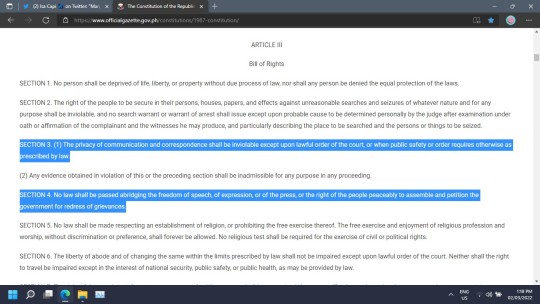
Above is a screenshot of Microsoft Edge from my laptop. The tab is showing a webpage from the Official Gazette of the Republic of the Philippines. The text shown is from Article III, the Bill of Rights, but the highlighted ones are Sections 3 (1) and 4. They read, "SECTION 3. (1) The privacy of communication and correspondence shall be inviolable except upon lawful order of the court, or when public safety or order requires otherwise as prescribed by law," and "SECTION 4. No law shall be passed abridging the freedom of speech, of expression, or of the press, or the right of the people peaceably to assemble and petition the government for redress of grievances," respectively.
The social media provision must be challenged first. We cannot let this law endanger us to predators on the internet.
#[ 🗣️ | the magical girl speaks ]#vetosimcardreg#vetosocmedreg#philippines#philippine politics#politics#law#sim card and social media registration act#human rights#privacy#right to privacy#online privacy#internet privacy#security#right to security#online security#internet security#internet safety#safety#right to safety#signal boost#important
620 notes
·
View notes
Text
Just saw some additional info regarding the SIM Card and SOCIAL MEDIA Registration Act which I heard might be passed a after half an hour from now.
Courtesy of the Computer Professionals Union (@/cpu_ph on Twitter)
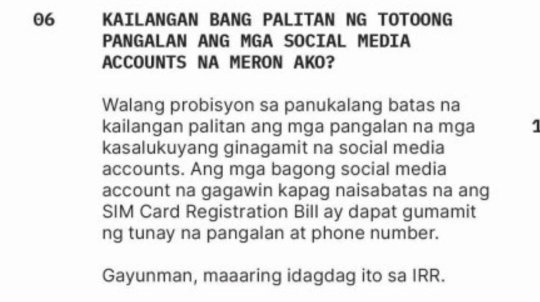
Translated Ver by Google Lens:
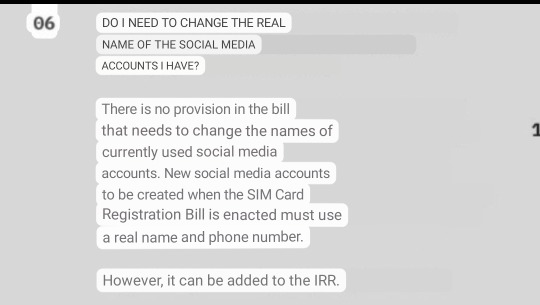
So basically pre-existing accounts are safe I guess...
The full document for everyone to see just in case:


4 notes
·
View notes
Text
The Filipinos and I will be forced to put our private and sensitive data on our social media accounts (such as addresses and phone numbers). This puts our online safety at risk and might even force people to stop using certain sites for protection. So please sign this petition and spread it around!!
0 notes
Note
there's a worrying bill that will pass in the Phillipines that will force internet users to essentially doxx themselves D: do you think you can help spread the word on it and encourage people to sign a petition against it?
there's info of it on twitter under the tags #VetoSIMCardReg, #VetoSocMedReg, and #BlockSIMRegistration
Man. Okay so I looked around for some stuff that better explains it than I do djdhdjd but it’s v worrying because it directly infringes on people’s right to privacy and anonymity
It’s finished and passed the third and final reading back in I think December or January, so now it’s awaiting only the president’s signature to be effectively passed.
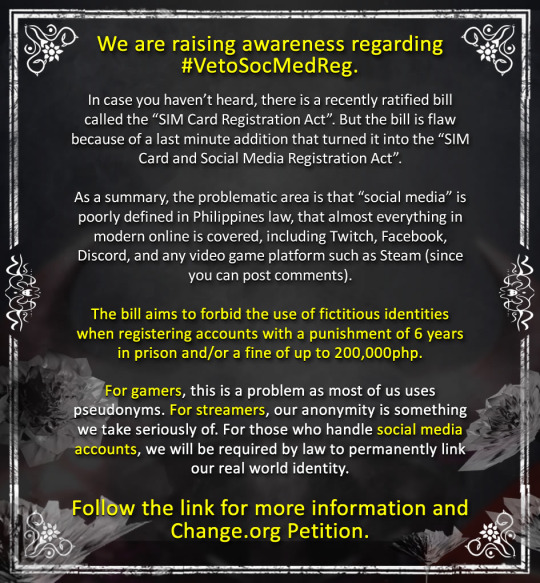
Here is an article that summarizes it in English
And here is the link to the petition (though only sign it if you’re Filipino otherwise it gets nullified)
Feel free to correct me if I get anything wrong, but that’s my understanding of it
#wolfy tedtalks#anon#hey girl I don’t want to get doxxed#LMAO#every day we stray further into state mandated surveillance
1K notes
·
View notes
Text
My brain: the SIM Card and SocMed Registration Act is not retroactive, as far as we're concerned. You're fine.
Me: It may not be retroactive but it will actively risk everyone who has yet to create any social media. If it's going to require us to share personal and sensitive information before we get to use social media... that's like asking us to strip naked before throwing ourselves to the wolves.
It forbids the usage of fictitious identities when registering accounts, meting out the draconian punishment of a minimum of 6 years in prison and/or a fine of up to ₱200,000. Essentially, it criminalizes anonymity and pseudonymity on the Internet – legitimate norms used by individuals who wish for privacy, artists/writers who use pen and stage names, parody/entertainment accounts, activists, dissenters, human rights defenders, LGBTQI, victims of abuse and violence, witnesses, whistleblowers, investigative journalists, and legitimate cybersecurity research and law enforcement operations.
Even the leaders who shaped our nation’s identity made use of fictitious names to freely express themselves: Jose Rizal (Laong Laan, Dimasalang), Antonio Luna (Taga-Ilog), Marcelo H. del Pilar (Plaridel), Andres Bonifacio (Agapito Bagumbayan), Emilio Jacinto (Dimas-Ilaw, Pingkian), and many others. In essence, were our heroes alive today, the state would be branding them as criminals.
Moreover, the requirement that corporations like social media providers mandatorily collect real names and private phone numbers even when they are normally optional, puts Filipino citizens in jeopardy. From a cybersecurity perspective, the law is creating additional vulnerabilities for individuals because of the potential for data breaches. Even the most well-funded companies and institutions are not immune to hacking and data leaks, like what happened to Yahoo in 2013 and 2014 and Facebook in 2019 and 2021 where the names and personal phone numbers of users were spread on the Internet. Should these reoccur and citizens’ names and phone numbers leak, it will open them to harassment, identity theft, financial crime, and other forms of harm.
Aside from these, the bill poses a dire threat to children’s safety. Forcing children to register with their real names on social media like in online games or communities may expose their real names to complete strangers on the Internet, opening them to harassment, doxing, scams, kidnapping, and even child sexual predators.
— from Democracy.Net.PH
Filipinos (especially those who live in the Philippines), sign the petition.
Foreigners, please share and spread awareness.
We still need 9,332 signatures for it to be printed and sent to the president.
#[ 🗣️ | the magical girl speaks ]#vetosimcardreg#vetosocmedreg#philippines#philippine politics#politics#law#sim card and social media registration act#human rights#privacy#right to privacy#online privacy#internet privacy#security#right to security#online security#internet security#internet safety#safety#right to safety#signal boost#important
160 notes
·
View notes
Text

WE DID IT. WE GOT THE PRESIDENT TO VETO THE SIM CARD AND SOCIAL MEDIA REGISTRATION ACT.
#[ 📢 | the magical girl's signal boost ]#signal boost#boost#vetosimcardreg#vetosocmedreg#blocksimcardreg#sim card and social media registration act#philippines#philippine politics#law#philippine law#right to privacy#right to safety#right to security#online privacy#online security#online safety
19 notes
·
View notes
Text
UP INTERNET opposes the SIM Card Registration Act, calls for people's action to defend privacy
Last December, both the House of Representatives and the Senate passed the SIM Card Registration Act, the most brazen attack on Filipinos’ right to privacy and freedom of expression online. This February, the two versions of the bill have been consolidated by the bicameral conference. It now awaits Duterte’s signature, or lapses into law if not vetoed before March 4.
UP INTERNET deems the SIM Card Registration Act as the most dangerous threat to internet freedom in Philippine history, being the final piece to legalize cyber-surveillance nationwide. Through the association of legal identities with SIM cards, it constrains the ability of the public to remain anonymous online. The added provisions on enforcing a real-name policy for social media further compounds the situation.
The policy effectively compromises freedom of expression as it increases the difficulty of remaining anonymous online. By associating internet connections with legal identities, the right to privacy is abrogated. These premises give those in power unprecedented access to private information as well as effective control over discourse online. Under the characteristically repressive administrations of the Philippines, this type of government access and control becomes a weapon to stifle righteous opposition against tyranny. There is no true democracy if the people are not given their right to privacy and freedom of expression, only totalitarian control of those with access to our data.
Not only this, similar policies across the globe were shown to be useless against crime despite lawmakers claiming otherwise. It may in fact lead to higher cases of smartphone and more importantly, identity theft. In Mexico, their version of the law was repealed just three years after it was passed. In July 2020, the government of Laos commenced its nationwide sim registration program. Residents who failed to register will not be able to communicate with other users and connect to the internet. Despite the country’s extension of registration, the policy would only make the internet less accessible to millions with no IDs and those in remote and rural areas.
Finally, the policy will hand over our data to the Philippine government, an entity notoriously lacking in information security measures. Not only is the SIM Card Registration Act repressive and undemocratic, it is also inutile and anti-poor.
The harmful bill is now in its final stage before becoming state policy. UP INTERNET calls on the Filipino people to defend our right to privacy and join the fight to free the internet. We must act now and do everything in our power to foil the passage of this bill.#
11 notes
·
View notes
Text

I mean... not a single mention of it in broadcasted television news earlier tonight too. It's almost... suspicious.
#[ 🗣️ | the magical girl speaks ]#vetosimcardreg#vetosocmedreg#blocksimcardreg#sim card and social media registration act#philippines#philippine politics
1 note
·
View note
Text
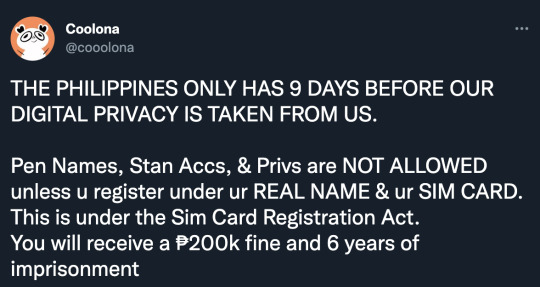

[ Image transcript: A tweet from user @/cooolona: THE PHILIPPINES ONLY HAS 9 DAYS BEFORE OUR DIGITAL PRIVACY IS TAKEN FROM US. Pen Names, Stan Accs, & Privs are NOT ALLOWED unless you register under your REAL NAME & your SIM CARD. This is under the Sim Card Registration Act. You will receive a ₱200k fine and 6 years of imprisonment.
Attached below is an image of a section from the bill, reading: For using fictitious identities to register SIM cards or social media accounts. - The penalty of imprisonment of no less than six (6) years, or a fine of up to Two hundred thousand pesos (₱200,000.00), or both, shall be imposed upon anyone who uses a fictitious identity to purchase and register a SIM cards or social media account. End transcript ]
bill info: https://democracy.net.ph/vetosocmedreg/
petitions: • https://www.change.org/vetosocmedreg • http://change.org/VetoSIMCardReg
other resources: • https://mobile.twitter.com/mariajianred/status/1496780148548390922 • https://www.philstar.com/headlines/2022/02/04/2158543/mandatory-sim-card-registration-puts-privacy-risk-might-not-curb-crime
Philippine lawmakers are back at it again, writing horribly-worded and vaguely-defined laws!
I'm so tired. Gusto ko nang lumayas.
#important!!#signal boost#philippines#pls bump ik a lots going on int the world rn but ahfkjafdjkfjka#i talk#srry op for hopping onto ur original post urs was the only one tagged with vetosocmedreg <//33#vetosocmedreg#vetosimcardreg
163 notes
·
View notes
Text
The Malacañang Palace had received the SIM Card and Social Media Registration Act last March 18, 2022.
The President now has the choice to sign it, veto it, or ignore it until the Act lapses into law.
We cannot let this take away our right to privacy and freedom of speech.
We need help more than ever.
Please.
reposting from my own Twitter thread
first tweeted on 11:25 AM, 02 March 2022 (Philippine Time)
Man, I don't know how I expect myself to concentrate in class today when the SIM Card and Social Media Registration Act is about to be passed into law on *Friday.* That bill is going to nullify our right to privacy and endanger our cyber safety. It's going to make us more prone to hacking/doxxing and, on top of that, makes red-tagging easier. I don't know how I'm supposed to go on about my day when there is a whole bill that is going to endanger us all. Sure, a lawyer may say that context is important when discerning whether the law was broken or not, but the bill's definitions were so vaguely written that discernment isn't enough. It shouldn't be, when the bill was supposed to definitively define and expound what it was supposed to be related to and what is permitted or not in the first place. People may say that it was supposed to be a counteraction to trolls and spreaders of misinformation, but what I'm reading is a weapon against those who are against... certain people in government. It's a weapon against activists journalists artists and even common, harmless civilians. Any- and everyone is at risk of being attacked, whether on the cyberspace or in real life. Who knows? I'm at risk, even if I say nothing about politics online. You're at risk, even if you don't use social media often. EVERYONE is at risk, no matter the frequency of our social media usage. At this rate, the safest way out of this is to not own any social media, but not having any social media contacts in this modern age? That can't be, not when having at least ONE is A NECESSITY. I know my voice may not even matter in the end, but I have to try. I have a right to privacy and safety on the internet.
Read the Act itself.
Read the statement urging for the current Philippine President to veto the Act.
Sign the petition. (locals only ; for foreigners, please share)
'Mandatory SIM card registration puts privacy at risk, might not curb crime' — Angela Y. Yang, Philstar.com
We are Filipino citizens who reserve the right to privacy and safety on the internet as well as the right to freedom of speech. It is in the 1987 Constitution, under Article III, Sections 3.1 (though conditional, it seems) and 4.

Above is a screenshot of Microsoft Edge from my laptop. The tab is showing a webpage from the Official Gazette of the Republic of the Philippines. The text shown is from Article III, the Bill of Rights, but the highlighted ones are Sections 3 (1) and 4. They read, "SECTION 3. (1) The privacy of communication and correspondence shall be inviolable except upon lawful order of the court, or when public safety or order requires otherwise as prescribed by law," and "SECTION 4. No law shall be passed abridging the freedom of speech, of expression, or of the press, or the right of the people peaceably to assemble and petition the government for redress of grievances," respectively.
The social media provision must be challenged first. We cannot let this law endanger us to predators on the internet.
#[ 📢 | the magical girl's signal boost ]#vetosimcardreg#vetosocmedreg#philippines#philippine politics#politics#law#sim card and social media registration act#human rights#privacy#right to privacy#online privacy#security#internet privacy#right to security#online security#internet security#internet safety#safety#right to safety#signal boost#important#free the internet
620 notes
·
View notes
Text
Please keep spreading this.
The petition has 65,478 / 75,000 signatures as of typing.
We still need 9,522 more signatures so that the petition can be printed and submitted to the president.
We have less than 24 hours left.
Please keep reblogging and share this around.
reposting from my own Twitter thread
first tweeted on 11:25 AM, 02 March 2022 (Philippine Time)
Man, I don't know how I expect myself to concentrate in class today when the SIM Card and Social Media Registration Act is about to be passed into law on *Friday.* That bill is going to nullify our right to privacy and endanger our cyber safety. It's going to make us more prone to hacking/doxxing and, on top of that, makes red-tagging easier. I don't know how I'm supposed to go on about my day when there is a whole bill that is going to endanger us all. Sure, a lawyer may say that context is important when discerning whether the law was broken or not, but the bill's definitions were so vaguely written that discernment isn't enough. It shouldn't be, when the bill was supposed to definitively define and expound what it was supposed to be related to and what is permitted or not in the first place. People may say that it was supposed to be a counteraction to trolls and spreaders of misinformation, but what I'm reading is a weapon against those who are against... certain people in government. It's a weapon against activists journalists artists and even common, harmless civilians. Any- and everyone is at risk of being attacked, whether on the cyberspace or in real life. Who knows? I'm at risk, even if I say nothing about politics online. You're at risk, even if you don't use social media often. EVERYONE is at risk, no matter the frequency of our social media usage. At this rate, the safest way out of this is to not own any social media, but not having any social media contacts in this modern age? That can't be, not when having at least ONE is A NECESSITY. I know my voice may not even matter in the end, but I have to try. I have a right to privacy and safety on the internet.
Read the Act itself.
Read the statement urging for the current Philippine President to veto the Act.
Sign the petition. (locals only ; for foreigners, please share)
'Mandatory SIM card registration puts privacy at risk, might not curb crime' — Angela Y. Yang, Philstar.com
We are Filipino citizens who reserve the right to privacy and safety on the internet as well as the right to freedom of speech. It is in the 1987 Constitution, under Article III, Sections 3.1 (though conditional, it seems) and 4.

Above is a screenshot of Microsoft Edge from my laptop. The tab is showing a webpage from the Official Gazette of the Republic of the Philippines. The text shown is from Article III, the Bill of Rights, but the highlighted ones are Sections 3 (1) and 4. They read, "SECTION 3. (1) The privacy of communication and correspondence shall be inviolable except upon lawful order of the court, or when public safety or order requires otherwise as prescribed by law," and "SECTION 4. No law shall be passed abridging the freedom of speech, of expression, or of the press, or the right of the people peaceably to assemble and petition the government for redress of grievances," respectively.
The social media provision must be challenged first. We cannot let this law endanger us to predators on the internet.
#[ 🗣️ | the magical girl speaks ]#vetosimcardreg#vetosocmedreg#philippines#philippine politics#politics#law#sim card and social media registration act#human rights#privacy#right to privacy#online privacy#internet privacy#security#right to security#online security#internet security#internet safety#safety#right to safety#long post
620 notes
·
View notes
Text
The Malacañang Palace had received the SIM Card and Social Media Registration Act last March 18, 2022.
The President now has the choice to sign it, veto it, or ignore it until the Act lapses into law.
We cannot let this take away our right to privacy and freedom of speech.
We need help now more than ever.
Please.
My brain: the SIM Card and SocMed Registration Act is not retroactive, as far as we're concerned. You're fine.
Me: It may not be retroactive but it will actively risk everyone who has yet to create any social media. If it's going to require us to share personal and sensitive information before we get to use social media... that's like asking us to strip naked before throwing ourselves to the wolves.
It forbids the usage of fictitious identities when registering accounts, meting out the draconian punishment of a minimum of 6 years in prison and/or a fine of up to ₱200,000. Essentially, it criminalizes anonymity and pseudonymity on the Internet – legitimate norms used by individuals who wish for privacy, artists/writers who use pen and stage names, parody/entertainment accounts, activists, dissenters, human rights defenders, LGBTQI, victims of abuse and violence, witnesses, whistleblowers, investigative journalists, and legitimate cybersecurity research and law enforcement operations. Even the leaders who shaped our nation’s identity made use of fictitious names to freely express themselves: Jose Rizal (Laong Laan, Dimasalang), Antonio Luna (Taga-Ilog), Marcelo H. del Pilar (Plaridel), Andres Bonifacio (Agapito Bagumbayan), Emilio Jacinto (Dimas-Ilaw, Pingkian), and many others. In essence, were our heroes alive today, the state would be branding them as criminals. Moreover, the requirement that corporations like social media providers mandatorily collect real names and private phone numbers even when they are normally optional, puts Filipino citizens in jeopardy. From a cybersecurity perspective, the law is creating additional vulnerabilities for individuals because of the potential for data breaches. Even the most well-funded companies and institutions are not immune to hacking and data leaks, like what happened to Yahoo in 2013 and 2014 and Facebook in 2019 and 2021 where the names and personal phone numbers of users were spread on the Internet. Should these reoccur and citizens’ names and phone numbers leak, it will open them to harassment, identity theft, financial crime, and other forms of harm. Aside from these, the bill poses a dire threat to children’s safety. Forcing children to register with their real names on social media like in online games or communities may expose their real names to complete strangers on the Internet, opening them to harassment, doxing, scams, kidnapping, and even child sexual predators.
— from Democray.Net.PH
Filipinos (especially those who live in the Philippines), sign the petition.
Foreigners, please share and spread awareness.
We still need 9,332 signatures for it to be printed and sent to the president.
#[ 📢 | the magical girl's signal boost ]#vetosimcardreg#vetosocmedreg#philippines#philippine politics#politics#law#sim card and social media registration act#human rights#privacy#right to privacy#online privacy#internet privacy#security#right to security#online security#internet security#internet safety#safety#right to safety#signal boost#important#free the internet
160 notes
·
View notes